WordPress Plugins For Managing WordPress Post Revisions
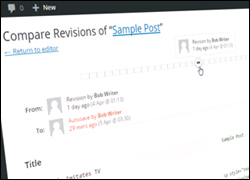
In a separate tutorial, we looked at the WordPress Post Revisions feature, where WordPress saves all your post revisions, so you can always go back to an earlier version of what you have written and restore it.
In this tutorial, we look at a number of WordPress plugins that will help you manage your post revisions.
Managing Revisions – WordPress Plugins
As soon as you update posts and pages, WordPress begins to store new revisions in its database. These show up in a Revisions box below the post editor …
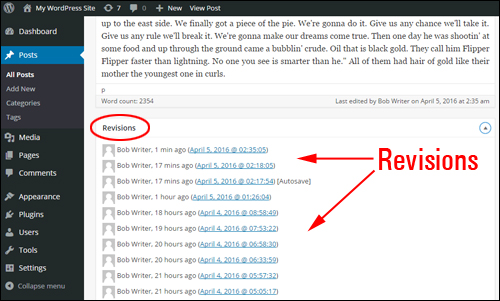
(Post Editor section – Viewing the revisions list)
Autosave and revisions are no doubt features that help create a more effective workflow. If you write extensively, however, the number of revisions can start building up. This can significantly increase the size of your WordPress database, so it’s important to also be able to manage your revisions.
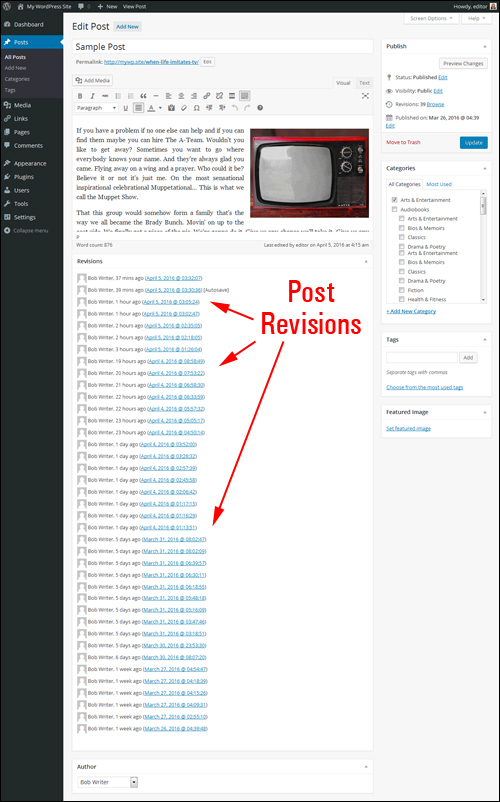
(Your WordPress database could be storing lots of unnecessary data)
For example, if you have 200 posts on your site and each post has 10 revisions your WordPress database could be storing up to 2,000 copies of unnecessary data. If your post is approximately 100KB data, then with 2,000 post revisions, the total database space wasted is about 200MB.
The good news is that there are some really great free WordPress plugins that can help you control and manage your revisions and reduce the size of your database. Here are some of these:
Better Delete Revision
(Better Delete Revision WP Plugin)
This plugin deletes redundant post revisions from your database and database content related to each revision such as relationships, meta information, tags, and more.
After installing and activating the plugin, you can use it to perform optimizations on your WordPress database.
Go to your WP Dashboard and select Settings > Better Delete Revision …
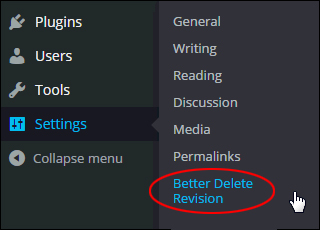
(Settings – Better Delete Revision)
This brings you to the Better Delete Revision Manager panel. Click ’Check Revision Posts’ to calculate how many redundant post revisions you can remove from your WordPress database …

(Better Delete Revision – Check Revision Posts)
A table of revisions stored in the WP database will be returned on the screen …
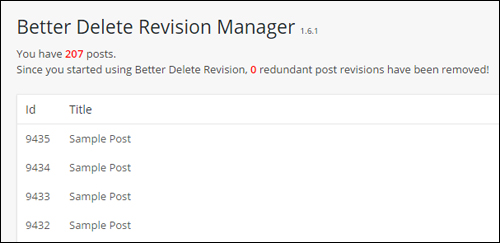
(Posts revisions list)
Click on the button below the list to clear the items from your WP database, or abandon the operation and exit the plugin screen with all post revisions undeleted …
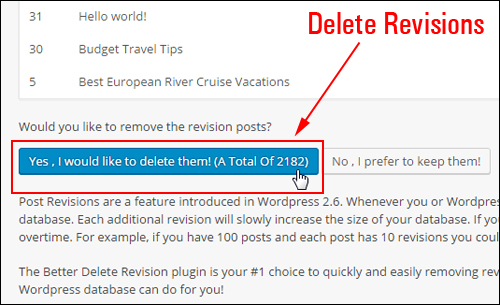
(Better Delete Revision – Clear posts revisions list)
The unnecessary data will be deleted from the database …
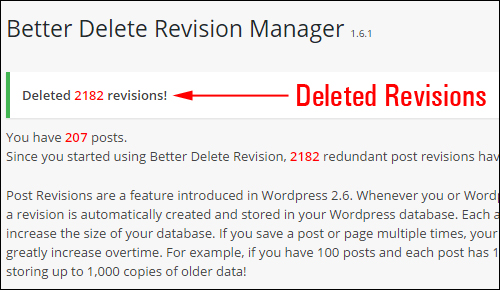
(List of post revisions cleared)
![]()
After some time has passed, we recommend running the tool again to keep your database as lean as possible, since WordPress will automatically begin saving all post revisions again (unless you have chosen to turn the feature off) …
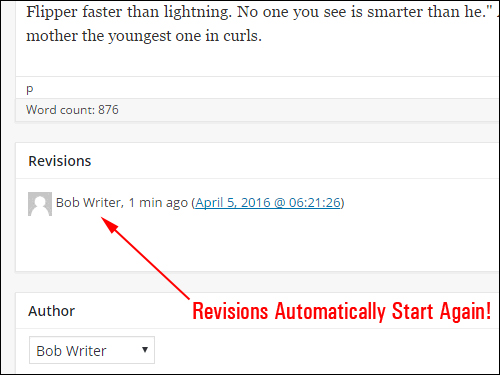
(WordPress will automatically begin to save your new revisions again!)
Like the other plugins described further below, you can also use this plugin to optimize the WordPress database …

(Keep your database optimized – Better Delete Revision)
Better Delete Revision checks to see if your WP database needs optimization and provides an easy one-click table optimization feature without the need to log into your server control panel …
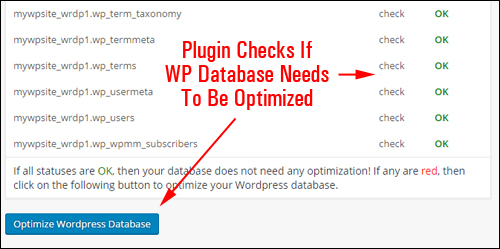
(Better Delete Revision lets you perform an easy one-click WordPress database optimization routine)
For more details, go here: Better Delete Revision Plugin For WordPress
Optimize Database after Deleting Revisions
(Optimize Database after Deleting Revisions WordPress Plugin)
This plugin is similar to the one described above. It not only lets you delete redundant post and page revisions (with the option of keeping a specific number of your most recent revisions) and checks if your WordPress database needs to be optimized, it also lets you perform database maintenance tasks such as:
- Delete trashed posts, comments, and pages
- Delete unused tags
- Delete ’orphan post meta items’
- Exclude certain posts/pages and tables from optimization
- Automatically schedule optimizations
- And more!
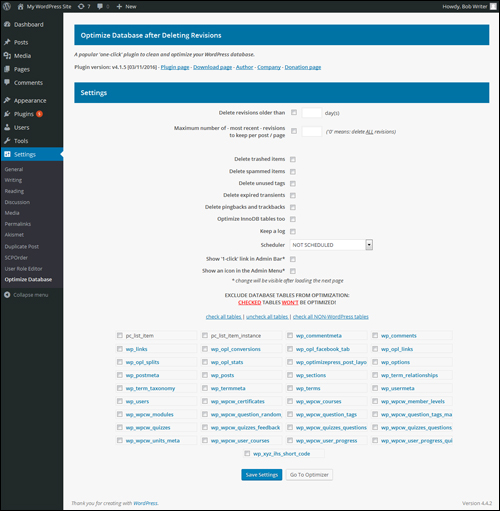
(Optimize Database after Deleting Revisions Plugin For WordPress – Settings Page)
For more details, go here: Optimize Database after Deleting Revisions Plugin For WordPress
WP Optimize
(WP-Optimize Plugin For WordPress)
In addition to cleaning unnecessary page and post revisions and performing database cleaning and optimization maintenance, WP Optimize also lets you do maintenance tasks like:
- Enable/Disable trackbacks for published posts
- Remove unapproved comments
- Mobile device friendly
- Remove all transient options
- Clean up auto draft posts
- Ability to keep selected number of weeks data when cleaning up
- Add or remove link on WP admin bar
- Enable/Disable weekly optimization schedules
- Display database table statistics (e.g. how much space can be optimized
- E-mail notifications after scheduled database cleanups
- Marks potentially dangerous cleanup items in red
- And more!
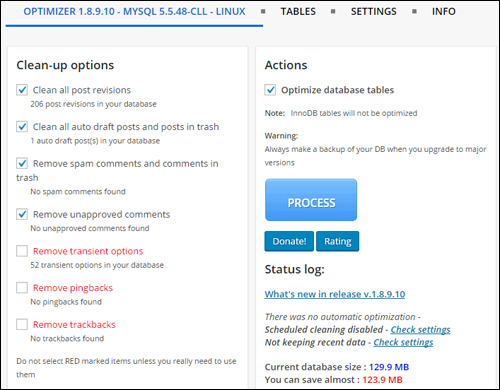
(WP-Optimize WP Plugin – Settings Screen)
For more details, go here: WP Optimize
WP-Sweep
(WP Sweep – WordPress Plugin)
In addition to optimizing your database tables and deleting unnecessary revisions, WP Sweep also cleans up:
- Auto drafts
- Unapproved comments
- Orphan term meta
- Duplicated post meta
- Transient options
- And more!
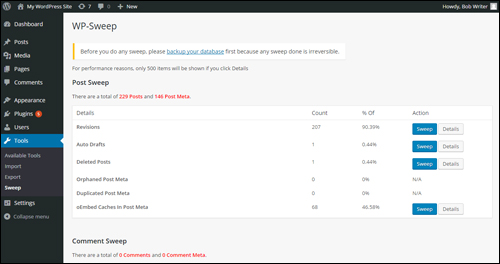
(WP-Sweep – Settings)
For more details, go here: WP-Sweep Plugin For WordPress
Simple Revisions Delete

This lightweight and simple-to-use plugin lets you purge (delete) your posts revisions either individually or all at once.
Once the plugin has been installed and activated, for example, a ‘Purge’ link appears next to the Revisions section in your Publish box (and in other sections of your admin area) allowing you to safely delete revisions.

For more details, go here: Simple Revisions Delete
WP REVISIONS CONTROL

This plugin lets you specify the number of revisions retained for each post type in the Settings > Writing screen.

For more details, go here: WP Revisions Control
In addition to the above plugins, you can view more plugins that can help you manage post revisions and optimize your WordPress database, go to Plugins > Add New and type in keywords like “Revisions“, “Optimize Database“, etc …
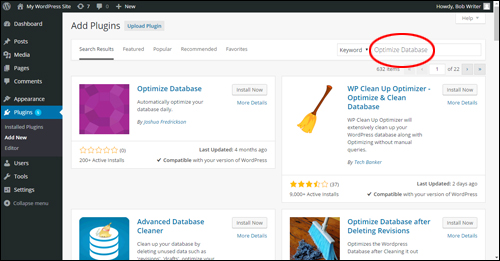
(Plugins Menu – Add Plugin)
We hope that you have found the above information on plugins that will help you manage your WordPress post revisions useful.
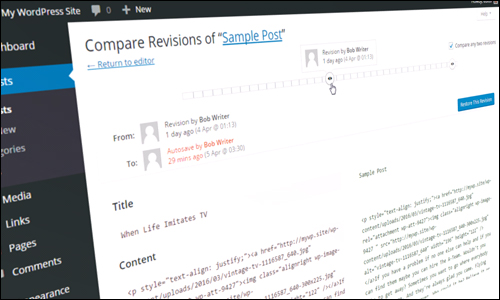
***
"Wow! I never knew there's so much to learn about WordPress! I bought one of the WordPress for Dummies three years ago, such authors need to be on this course!" - Rich Law, Create A Blog Now
***



